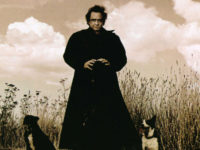Rosanne Cash’s completely realized, stunningly detailed, profoundly touching new album isn’t just a journey through the American South. This is a journey through its soul, its heartbreak, its redemption — and her’s, too. The River and the Thread — due January, 14, 2014, from Blue Note Records — is as writerly as earlier successes like Interiors were personal, with universal themes that give it a sense of almost otherworldly timelessness.
That it was sparked by a pilgimage back to Arkansas and the country village of her father Johnny Cash’s childhood comes as little surprise.
The River and the Thread, in fact, has elements of all of trips she took in a searcher’s quest outward from Dyess (which clearly inspired “Sunken Lands” here), past the house where William Faulkner once lived (ditto, “World of Strange Design”), and the abandoned country store where a 14-year-old boy named Emmett Till was said to have made the fateful mistake of flirting with a white woman (“Money Road”), on to the Tallahatchie Bridge where Bobby Gentry says Billy Joe took his life and over to the Dockery Farms plantation where Charley Patton and Howlin’ Wolf once toiled. All of this, the bad and the good, the fanciful and the horrifying, finds a home in this layered triumph.
Cash has also added a Civil War ballad in “When the Master Calls the Roll” — she had relatives on both sides of the conflict, including Lt. William Cash of Massachusetts — moments of longing and loss (“Etta’s Tune,” “Tell Heaven”), of lingering passion despite it all (“Modern Blue,” “Night School”) and messages of timeless intelligence and wonder, passed down from elders along the way (notably the opening “A Feather’s Not a Bird” — which sets the stage for every revelation, large and small, that follows).
It seems all of these sojourns, through kudzu-covered hollers and over swampy watersheds, ultimately kept leading Cash back through her own faraway birthplace of Memphis: “The Long Way Home” has a nervy thump very reminiscent of the sound of Sun Studios, where her dad helped reshaped the landscape of popular music. “50,000 Watts” sounds like a lonesome cry from the same period, too.
Along the way, Cash gets assists from husband John Leventhal, who serves as guitarist, arranger and producer; as well as Derek Trucks, Tony Joe White, Rodney Crowell (who co-wrote “When the Master”), John Prine and Paul White of the Civil Wars. But, make no mistake, this album is her statement — and her’s alone. In traveling back, back to her own roots and through our shared history, The River and the Thread has found a brand-new story to tell — and it’s Rosanne Cash’s most engrossing yet.
[amazon_enhanced asin=”B00FZRMIYY” container=”” container_class=”” price=”All” background_color=”FFFFFF” link_color=”000000″ text_color=”0000FF” /] [amazon_enhanced asin=”B003O5MNPI” container=”” container_class=”” price=”All” background_color=”FFFFFF” link_color=”000000″ text_color=”0000FF” /] [amazon_enhanced asin=”B0000028OP” container=”” container_class=”” price=”All” background_color=”FFFFFF” link_color=”000000″ text_color=”0000FF” /] [amazon_enhanced asin=”B000CETWOY” container=”” container_class=”” price=”All” background_color=”FFFFFF” link_color=”000000″ text_color=”0000FF” /] [amazon_enhanced asin=”B0029LHW5E” container=”” container_class=”” price=”All” background_color=”FFFFFF” link_color=”000000″ text_color=”0000FF” /]
- Nick DeRiso’s Best of 2015 (Rock + Pop): Death Cab for Cutie, Joe Jackson, Toto + Others - January 18, 2016
- Nick DeRiso’s Best of 2015 (Blues, Jazz + R&B): Boz Scaggs, Gavin Harrison, Alabama Shakes - January 10, 2016
- Nick DeRiso’s Best of 2015 (Reissues + Live): John Oates, Led Zeppelin, Yes, Faces + others - January 7, 2016



